|
SpaceWeather Information & Resources
Getting Ready for the Next Big Solar Storm
Heliophysics |
NASA Living With a Star |
Heliophysics Summer School
NOAA Space Weather Prediction Center |
The Australian Space Weather Agency
Space Weather Radio |
ESA Space Environment Information System
Realtime Space Weather Photo Gallery
Realtime Meteor Photo Gallery

January 2014 Celestial Events & Space Research News
January 2014 SkyMaps & Sky Guides will not be available until January 1st
The Astronomy Picture of the Day feature will not be available until that date
It is updated daily using Universal Time (UT) which is the same as GMT
January 2014 –
SkyMaps & Celestial Guides
……………………………………………………..
Astronomy Today Sky Guide – January 2014
BBC The Sky at Night – January 2014
Meteorite Times Magazine – January 2014
Radio Jove – Solar & Planetary Radio Astronomy for Schools
The Cassini Solstice Mission – Latest News & Current Location
At the start of January 2014 the Sunspot Number is 107
Your 2014 Aussie sky guide
“Voyager 1 Goes Interstellar”
“Astronomers Search for Moons Circling Distant Exoplanets”
“Chelyabinsk Meteor Equaled Nearly 30 Hiroshima Bombs”
“New constraints on volcano-tectonic evolution of large volcanic edifices on Venus”
“The Case against Copernicus”
“New Signs of Long-Gone Life on Mars”
January 01 2014 – 11:14 UT –
New Moon
January 01 2014 –
Today’s Celestial Events & Space Exploration News
……………………
Astronomy Picture of the Day
Asteroid 2014 AF5 flyby – miss distance 0.3 LD, size = 8 metres
Asteroid 6239 Minos –
Closest Approach To Earth (0.693 AU)
January 01-14 2014
NASA Astrobiology Institute, University of Hawai’i, USA
NASA-NORDIC Astrobiology Winter School
“Water and the Evolution of Life in the Universe”
January 02 2014 –
Today’s Celestial Events & Space Exploration News
……………………
Astronomy Picture of the Day
Asteroid 2014 AA flyby – miss distance 0.001 LD, size = 3 metres
On Jan. 2, 2014, the NASA All-Sky Fireball Network reported 6 fireballs
“Small Asteroid 2014 AA Hits Earth”
“Three-Meter Asteroid Hits Earth’s Atmosphere… Somewhere”
“The Sky This Week for the Southern Hemisphere January 02 – January 09”
January 03 2014 –
Today’s Celestial Events & Space Exploration News
……………………
Astronomy Picture of the Day
Quadrantids Meteor Shower History
Quadrantids (QUA) Meteor Shower Peak 19:30 UT – IMO Details & SkyMap
Asteroid 2013 YL2 flyby – miss distance 3.6 LD, size = 101 metres
“Quadrantid Meteor Shower Live Stream: When & Where To Watch”
“The Quadrantid Meteor Shower-One of the Best Bets for 2014”
Quadrantid Meteor Shower
Live Coverage!

January 04 2014 – 12:00 UT –
Earth at Perihelion
(closest to the Sun – 0.983 AU)
January 04 2014 –
Today’s Celestial Events & Space Exploration News
……………………
Astronomy Picture of the Day
Asteroid 9548 Fortran Closest Approach To Earth (0.858 AU)
“On Jan. 4, 2014, the All-Sky Fireball Network reported 35 fireballs”
January 05 2014 –
Today’s Celestial Events & Space Exploration News
……………………
Astronomy Picture of the Day
Jupiter at
Opposition
January 06 2014 –
Today’s Celestial Events & Space Exploration News
……………………
Astronomy Picture of the Day
An S1-class solar radiation storm is in progress today
As of today there are 1449 known Potentially Hazardous Asteroids
Asteroid 2013 YM48 flyby – miss distance 8.8 LD, size = 32 metres
“An astronaut’s [body clock] rhythm”
January 07 2014 –
Today’s Celestial Events & Space Exploration News
……………………
Astronomy Picture of the Day
Crescent Venus Realtime Photo Gallery
Mercury Passes 6.5 Degrees From
Venus
Asteroid 2013 YV102 flyby – miss distance 6.7 LD, size = 34 metres
“An unblinking eye – the Cat’s Eye Nebula”
“BBC Stargazing Live Episode One – iPlayer 10 Days Left”
WakeUpRosetta – Wake up!

January 08 2014 – 03:39 UT –
End of First Lunar Quarter
January 08 2014 –
Today’s Celestial Events & Space Exploration News
……………………
Astronomy Picture of the Day
As of today there are 1451 known Potentially Hazardous Asteroids
Asteroid 2062 Aten –
Closest Approach To Earth (0.146 AU)
Asteroid 2014 AD16 flyby – miss distance 1.5 LD, size = 15 metres
“Journey to a billion suns – world premiere of planetarium show”
“Gaia enters its operational orbit”
“BBC Stargazing Live Episode Two tonight at 20:00 on BBC2”
January 09 2014 –
Today’s Celestial Events & Space Exploration News
……………………
Astronomy Picture of the Day
Asteroid 2014 AE29 flyby – miss distance 4.1 LD, size = 16 metres
“BBC Stargazing Live Episode Three tonight at 20:00 on BBC2”
“The Sky This Week for the Southern Hemisphere January 09 – January 16”
January 10 2014 –
Today’s Celestial Events & Space Exploration News
……………………
Astronomy Picture of the Day
Asteroid 2014 AW32 flyby – miss distance 0.5 LD, size = 14 metres
Asteroid 2013 AF53 –
Near-Earth Flyby (0.058 AU)
Comet 290P/Jager –
Closest Approach To Earth (1.281 AU)
“Starting Fire With Water”
January 11 2014 –
Today’s Celestial Events & Space Exploration News
……………………
Astronomy Picture of the Day
January 12 2014 –
Today’s Celestial Events & Space Exploration News
……………………
Astronomy Picture of the Day
January 13 2014 –
Today’s Celestial Events & Space Exploration News
……………………
Astronomy Picture of the Day
Meteorite Times Magazine January 2014 Edition now available online
“The abstract science of the dynamic Sun”
“Space exploration in 2014”
“Searching for life in strange places”
January 14 2014 –
Today’s Celestial Events & Space Exploration News
……………………
Astronomy Picture of the Day
Asteroid 2006 –
Near-Earth Flyby (0.100 AU)
“Countdown to Pluto”
“The floodwaters of Mars”
January 15 2014 –
Today’s Celestial Events & Space Exploration News
……………………
Astronomy Picture of the Day
“Rosetta phone home”
January 16 2014 – 04:52 UT –
Full Wolf Moon
January 16 2014 –
Today’s Celestial Events & Space Exploration News
……………………
Astronomy Picture of the Day
“The Sky This Week for the Southern Hemisphere January 16 – January 23”
“The most important alarm clock in the Solar System”
January 17 2014 –
Today’s Celestial Events & Space Exploration News
……………………
Astronomy Picture of the Day
“Watch the wake-up of Europe’s comet chaser Rosetta live from ESA”
“The midwinter sunset alignment at Kintraw, Argyll – a response”
January 18 2014 –
Today’s Celestial Events & Space Exploration News
……………………
Astronomy Picture of the Day
January 19 2014 –
Today’s Celestial Events & Space Exploration News
……………………
Astronomy Picture of the Day
“Off earth mining and the opening of space”
January 20 2014 –
Today’s Celestial Events & Space Exploration News
……………………
Astronomy Picture of the Day
Asteroid 277570 (2005 YP180) –
Near-Earth Flyby (0.078 AU)
“Recent view of Rosetta’s destination comet – 67P/Churyumov–Gerasimenko”
“Astronomers ‘see’ strands of cosmic web”
“ESA’s ‘sleeping beauty’ wakes up from deep space hibernation”
January 21 2014 –
Today’s Celestial Events & Space Exploration News
……………………
Astronomy Picture of the Day
Asteroid 251346 (2007 SJ) –
Near-Earth Flyby (0.049 AU)
“Space droids battle to save Earth from comet”
“First Contact: Rosetta Wake-Up Signal Cheer”
January 22 2014 –
Today’s Celestial Events & Space Exploration News
……………………
Astronomy Picture of the Day
“Herschel discovers water vapour around dwarf planet Ceres”
“StarStuff Podcast – Rosetta awakens for comet landing”
“Water Detected on Dwarf Planet Ceres”
January 23 2014 –
Today’s Celestial Events & Space Exploration News
……………………
Astronomy Picture of the Day
Asteroid 2013 NC15 –
Near-Earth Flyby (0.069 AU)
Comet 293P/Spacewatch –
Closest Approach To Earth (1.142 AU)
“The Sky This Week for the Southern Hemisphere January 23 – January 30”
“Is the water vapor-spouting dwarf planet Ceres hiding alien lifeforms?”
January 24 2014 – 05:19 UT –
End of Third Lunar Quarter
January 24 2014 –
Today’s Celestial Events & Space Exploration News
……………………
Astronomy Picture of the Day
As of today there are 1453 known Potentially Hazardous Asteroids
Asteroid 2014 BZ2 flyby – miss distance 6 LD, size = 35 metres
“Mars once had fresh water on surface”
January 25 2014 –
Today’s Celestial Events & Space Exploration News
……………………
Astronomy Picture of the Day
“China’s moon rover Yutu (Jade Rabbit) experiences abnormality”
January 26 2014 –
Today’s Celestial Events & Space Exploration News
……………………
Astronomy Picture of the Day
Asteroid 2014 BA3 flyby – miss distance 5.9 LD, size = 10 metres
Asteroid 2014 BP8 flyby – miss distance 3.9 LD, size = 16 metres
“China’s Chang’e-3 mission homepage”
January 27 2014 –
Today’s Celestial Events & Space Exploration News
……………………
Astronomy Picture of the Day
“The whirl of stellar life”
January 28 2014 –
Today’s Celestial Events & Space Exploration News
……………………
Astronomy Picture of the Day
Asteroid 2012 BX34 flyby – miss distance 9.6 LD, size = 13 metres
Asteroid 2014 BM25 flyby – miss distance 2.7 LD, size = 10 metres
Asteroid 2014 BK25 flyby – miss distance 3.2 LD, size = 14 metres
Asteroid 2012 BX34 –
Near-Earth Flyby (0.025 AU)
January 29 – February 02 2014
Dade City, Florida, USA
“20th Annual International Orange Blossom Special Star Party”
January 29 2014 –
Today’s Celestial Events & Space Exploration News
……………………
Astronomy Picture of the Day
“StarStuff Podcast – Wobble gives ancient stars away”
“Rosetta wide awake as check-up continues”
“Your 2014 Aussie sky guide”
January 30 2014 – 21:39 UT –
New Moon
January 30 2014 –
Today’s Celestial Events & Space Exploration News
……………………
Astronomy Picture of the Day
“The Sky This Week for the Southern Hemisphere January 30 – February 06”
January 31 2014 –
Today’s Celestial Events & Space Exploration News
……………………
Astronomy Picture of the Day
Chinese New Year
Asteroid 2008 CM20 –
Near-Earth Flyby (0.086 AU)
Mercury At Its Greatest Eastern
Elongation (18 Degrees)
“Getting ready for asteroids”
You Can Help To Support This Free Service
If You Buy Your Books About:
Comets & Cometary Debris , ,
Asteroids , ,
Meteors & Meteor Showers
Impact Craters , ,
Meteorites and and
General Astronomy
From These Links Provided By
The Morien Institute
SpaceWeather Information & Resources
Getting Ready for the Next Big Solar Storm
Heliophysics |
NASA Living With a Star |
Heliophysics Summer School
NOAA Space Weather Prediction Center |
The Australian Space Weather Agency
Space Weather Radio |
ESA Space Environment Information System
Realtime Space Weather Photo Gallery
Realtime Meteor Photo Gallery

Heliophysics is a fast-developing scientific discipline that integrates studies of the Sun’s variability,
the surrounding heliosphere, and the environment and climate of planets
Over the past few centuries, our understanding of how the Sun drives space weather and climate
on the Earth and other planets has advanced at an ever increasing rate
February 2014 Celestial Events & Space Research News
February 2014 SkyMaps & Sky Guides will not be available until February 1st
The Astronomy Picture of the Day feature will not be available until that date
It is updated daily using Universal Time (UT) which is the same as GMT
February 2014 –
SkyMaps & Celestial Guides
…………………………………………………….
Astronomy Today Sky Guide – February 2014
BBC The Sky at Night – February 2014
Meteorite Times Magazine – February 2014
Radio Jove – Solar & Planetary Radio Astronomy for Schools
The Cassini Solstice Mission – Latest News & Current Location
Your 2014 Aussie sky guide
At the start of February 2014 the Sunspot Number is 87
February 01 2014 –
Today’s Celestial Events & Space Exploration News
………………….
Astronomy Picture of the Day
Asteroid 2014 CE flyby – miss distance 1.4 LD, size = 17 metres
“Weakened Immunity in Space-Raised Flies”
February 02 2014 –
Today’s Celestial Events & Space Exploration News
………………….
Astronomy Picture of the Day
Asteroid 2014 BX43 flyby – miss distance 9 LD, size = 30 metres
Asteroid 2014 BM62 flyby – miss distance 3.2 LD, size = 38 metres
February 02-06 2014
Atlanta, Georgia, USA
“94th American Meteorological Society (AMS) Annual Meeting”
February 03 2014 –
Today’s Celestial Events & Space Exploration News
………………….
Astronomy Picture of the Day
Asteroid 2013 BZ45 –
Near-Earth Flyby (0.069 AU)
Asteroid 2014 BW32 flyby – miss distance 1.9 LD, size = 23 metres
“Churning atmosphere on Saturn”
February 03-05 2014
Atlanta, Georgia, USA
Conference
“Vesta in the Light of Dawn”
February 04 2014 –
Today’s Celestial Events & Space Exploration News
………………….
Astronomy Picture of the Day
“Kepler Finds a Very Wobbly Planet”
February 05 2014 –
Today’s Celestial Events & Space Exploration News
………………….
Astronomy Picture of the Day
Comet 107P/Wilson-Harrington –
Perihelion (0.994 AU)
“StarStuff Podcast – Chelyabinsk meteor strike: what did we learn?”
February 05-07 2014
Pasadena, California, USA
Workshop
“The Habitability of Icy Worlds”

February 06 2014 – 19:22 UT –
End of First Lunar Quarter
February 06 2014 –
Today’s Celestial Events & Space Exploration News
………………….
Astronomy Picture of the Day
“The Sky This Week for the Southern Hemisphere February 06 – February 13”
“Gaia comes into focus”
“Swarm heads for new heights”
February 07 2014 –
Today’s Celestial Events & Space Exploration News
………………….
Astronomy Picture of the Day
Asteroid 348306 (2005 AY28) –
Near-Earth Flyby (0.039 AU)
Comet 277P/LINEAR –
Closest Approach To Earth (1.878 AU)
February 08 2014 –
Today’s Celestial Events & Space Exploration News
………………….
Astronomy Picture of the Day
alpha–Centaurids (ACE) Meteor Shower Peak 06:00 UT – IMO Details & SkyMap
Asteroid 2014 BP43 flyby – miss distance 5.5 LD, size = 22 metres
February 09 2014 –
Today’s Celestial Events & Space Exploration News
………………….
Astronomy Picture of the Day
Asteroid 2014 CR13 flyby – miss distance 2.2 LD, size = 31 metres
Comet 112P/Urata-Niijima –
Closest Approach To Earth (1.812 AU)
February 09-14 2014
Yosemite National Park, California, USA
AGU Chapman Conference
“Magnetosphere-Ionosphere Coupling in the Solar System”
February 10 2014 –
Today’s Celestial Events & Space Exploration News
………………….
Astronomy Picture of the Day
Asteroid 2006 DP14 flyby – miss distance 6.2 LD, size = 730 metres
Asteroid 2006 DP14 –
Near-Earth Flyby (0.016 AU)
Asteroid 2014 CF13 flyby – miss distance 9.6 LD, size = 44 metres
“Overflowing craters: The flood after the impact”
“Galileo works, and works well”
February 11 2014 –
Today’s Celestial Events & Space Exploration News
………………….
Astronomy Picture of the Day
Asteroid 2013 BS45 –
Near-Earth Flyby (0.032 AU)
Asteroid 2014 BT43 flyby – miss distance 9.8 LD, size = 31 metres
“Astronomers discover earliest archaeological star of our galaxy”
“Stephen Hawking has doubts about the existence of black holes”
“Star-rich galaxy found from universe’s baby years”
February 12 2014 –
Today’s Celestial Events & Space Exploration News
………………….
Astronomy Picture of the Day
Asteroid 2014 CB3 flyby – miss distance 8.8 LD, size = 26 metres
“Prehistoric cave pigment to shield ESA’s solar probe”
“A good year to find a comet”
February 13 2014 –
Today’s Celestial Events & Space Exploration News
………………….
Astronomy Picture of the Day
As of today there are 1457 known Potentially Hazardous Asteroids
“The Sky This Week for the Southern Hemisphere February 13 – February 20”
February 14 2014
The Geological Society, London
“Royal Astronomical Society Ordinary Meeting”

February 14 2014 – 23:53 UT –
Full Snow Moon
February 14 2014 –
Today’s Celestial Events & Space Exploration News
………………….
Astronomy Picture of the Day
Comet 107P/Wilson-Harrington –
Closest Approach To Earth (1.817 AU)
“10 More Years for the ISS”
“One in four Americans unaware that Earth circles Sun”
“Mars Rover Solves Doughnut Riddle”
February 15 2014 –
Today’s Celestial Events & Space Exploration News
………………….
Astronomy Picture of the Day
Comet 169P/NEAT –
Perihelion (0.608 AU)
Mars Summer Solstice
February 16 2014 –
Today’s Celestial Events & Space Exploration News
………………….
Astronomy Picture of the Day
Comet 266P/Christensen –
Closest Approach To Earth (1.590 AU)
Solar WeatherWatch
February 16 2014 Update
February 17 2014 –
Today’s Celestial Events & Space Exploration News
………………….
Astronomy Picture of the Day
Asteroid 2000 EM26 –
Near-Earth Flyby (0.020 AU)
February 18 2014 –
Today’s Celestial Events & Space Exploration News
………………….
Astronomy Picture of the Day
Asteroid 2000 EM26 flyby – miss distance 8.8 LD, size = 195 metres
February 18-19 2014
Space Research & Technology Centre, Noordwijk, Netherlands
ESA, NASA and Russian Academy IKI
“Science and Challenges of Lunar Sample Return Workshop”
February 19 2014 –
Today’s Celestial Events & Space Exploration News
………………….
Astronomy Picture of the Day
Comet C/2013 V3 (Nevski) –
At Opposition (1.200 AU)
“How often do we see an occultation of Saturn?”
“Geomagnetic storm from CME impact still under way”
“StarStuff Podcast – Making square nebulae from round stars”
“Supernovas Slosh Before Exploding”
February 20 2014 –
Today’s Celestial Events & Space Exploration News
………………….
Astronomy Picture of the Day
Asteroid 2014 BR57 flyby – miss distance 4.4 LD, size = 71 metres
“The Sky This Week for the Southern Hemisphere February 20 – February 27”
“A G1-class geomagnetic storm is now in progress”
“Auroras And Reindeers – incredible photo from Ole Salomonsen in Norway”
February 21 2014 –
Today’s Celestial Events & Space Exploration News
………………….
Astronomy Picture of the Day
Asteroid 2012 DY43 –
Near-Earth Flyby (0.040 AU)
Asteroid 1995 CR flyby – miss distance 7.7 LD, size = 215 metres
Asteroid 2014 DK10 flyby – miss distance 0.7 LD, size = 12 metres
Comet C/2012 X1 (LINEAR) –
Perihelion (1.599 AU)
“This Week’s Sky at a Glance from Sky & Telescope”
“How to catch a satellite”
“Pulsar rocked by billion-tonne asteroid”
February 22 2014 – 17:15 UT –
End of Third Lunar Quarter
February 22 2014 –
Today’s Celestial Events & Space Exploration News
………………….
Astronomy Picture of the Day
February 23 2014 –
Today’s Celestial Events & Space Exploration News
………………….
Astronomy Picture of the Day
Asteroid 2014 DH6 flyby – miss distance 2 LD, size = 30 metres
February 24 2014 –
Today’s Celestial Events & Space Exploration News
………………….
Astronomy Picture of the Day
As of today there are 1458 known Potentially Hazardous Asteroids
Asteroid 2014 CR flyby – miss distance 8.3 LD, size = 124 metres
“Stellar Inventory: Searching For Other Earths”
“A Meteorite Lights up the Lunar Night”
February 24-28 2014
Parys, Free State, South Africa
Conference: Tribes of the Deep Sky
“Multiwavelength studies of galaxy populations
in groups and clusters”
February 25 2014 –
Today’s Celestial Events & Space Exploration News
………………….
Astronomy Picture of the Day
Comet 266P/Christensen –
At Opposition (1.601 AU)
February 26 2014 –
Today’s Celestial Events & Space Exploration News
………………….
Astronomy Picture of the Day
Asteroid 2 Pallas At Opposition (6.3 Magnitude)
Comet 277P/LINEAR –
At Opposition (1.925 AU)
“StarStuff Podcast – Earth’s oldest minerals found in Western Australia”
“A Breakthrough in Planet Discoveries”
NASA ScienceCasts
A Sudden Multiplication of Planets
February 27 2014 –
Today’s Celestial Events & Space Exploration News
………………….
Astronomy Picture of the Day
“The Sky This Week for the Southern Hemisphere February 27 – March 06”
February 27 – March 03 2014
Brighstone Holiday Centre, Isle of Wight, England
“Isle of Wight Star Party 2014”
February 28 2014 –
Today’s Celestial Events & Space Exploration News
………………….
Astronomy Picture of the Day
February 28 – March 01 2014
Harmony, Florida, USA
“11th Annual Dark Sky Festival”

You Can Help To Support This Free Service
If You Buy Your Books About:
Comets & Cometary Debris , ,
Asteroids , ,
Meteors & Meteor Showers
Impact Craters , ,
Meteorites and and
General Astronomy
From These Links Provided By
The Morien Institute
SpaceWeather Information & Resources
Getting Ready for the Next Big Solar Storm
Heliophysics |
NASA Living With a Star |
Heliophysics Summer School
NOAA Space Weather Prediction Center |
The Australian Space Weather Agency
Space Weather Radio |
ESA Space Environment Information System
Realtime Space Weather Photo Gallery
Realtime Meteor Photo Gallery

Heliophysics is a fast-developing scientific discipline that integrates studies of the Sun’s variability,
the surrounding heliosphere, and the environment and climate of planets
Over the past few centuries, our understanding of how the Sun drives space weather and climate
on the Earth and other planets has advanced at an ever increasing rate
March 2014 Celestial Events & Space Research News
March 2014 SkyMaps & Sky Guides will not be available until March 1st
The Astronomy Picture of the Day feature will not be available until that date
It is updated daily using Universal Time (UT) which is the same as GMT
March 2014 –
SkyMaps & Celestial Guides
………………………………………………………..
Astronomy Today Sky Guide – March 2014
BBC The Sky at Night – March 2014
Meteorite Times Magazine – March 2014
Radio Jove – Solar & Planetary Radio Astronomy for Schools
The Cassini Solstice Mission – Latest News & Current Location
Your 2014 Aussie sky guide
At the start of March 2014 the Sunspot Number is 279
“Hemispheric Sunspot Unit Area: Comparison with Hemispheric Sunspot Number… “
“Extra-nuclear Starbursts: Young Luminous Hinge Clumps in Interacting Galaxies”
“Cold Dust in Hot Regions”
“Rotational Properties of the Maria Asteroid Family”
March 01 2014 – 08:00 UT –
New Moon
March 01 2014 –
Today’s Celestial Events & Space Exploration News
………………………
Astronomy Picture of the Day
Many mid-latitude Auroras after large CME hits Earth’s magnetic field
As of today there are 1459 known Potentially Hazardous Asteroids
Comet P/2007 H3 (Garradd) –
Perihelion (1.831 AU)
March 02 2014 –
Today’s Celestial Events & Space Exploration News
………………………
Astronomy Picture of the Day
As of today there are 1460 known Potentially Hazardous Asteroids
March 03 2014 –
Today’s Celestial Events & Space Exploration News
………………………
Astronomy Picture of the Day
“Star factory NGC 7538”
“‘Life as we know it’ unlikely on super Earths”
March 03-05 2014
Washington DC, USA
The National Research Council
“Space Science Week”
March 04 2014 –
Today’s Celestial Events & Space Exploration News
………………………
Astronomy Picture of the Day
March 05 2014 –
Today’s Celestial Events & Space Exploration News
………………………
Astronomy Picture of the Day
Asteroid 2014 DX110 flyby – miss distance 0.9 LD, size = 31 metres
“StarStuff Podcast – Black widow pulsar has a killer bite”
March 06 2014 –
Today’s Celestial Events & Space Exploration News
………………………
Astronomy Picture of the Day
Asteroid 2014 EC flyby – miss distance 0.2 LD, size = 10 metres
“Lava floods the ancient plains of Mars”
“The Sky This Week for the Southern Hemisphere March 06 – March 13”
“Hubble Witnesses Asteroid’s Mysterious Disintegration”
March 07 2014 –
Today’s Celestial Events & Space Exploration News
………………………
Astronomy Picture of the Day
Comet 52P/Harrington-Abell –
Perihelion (1.773 AU)
Comet 112P/Urata-Niijima –
At Opposition (1.894 AU)
“A Telescope Bigger than a Galaxy”
NASA ScienceCasts
A Telescope Bigger than a Galaxy
March 08 2014 – 13:27 UT –
End of First Lunar Quarter
March 08 2014 –
Today’s Celestial Events & Space Exploration News
………………………
Astronomy Picture of the Day
March 09 2014 –
Today’s Celestial Events & Space Exploration News
………………………
Astronomy Picture of the Day
Daylight Saving – Set Clock Ahead 1 Hour – (United States)
Asteroid 357622 (2005 EY95) –
Near-Earth Flyby (0.068 AU)
Asteroid 2014 EX24 flyby – miss distance 0.7 LD, size = 8 metres
“Chinese space ambitions and private rocketeers”
March 10 2014 –
Today’s Celestial Events & Space Exploration News
………………………
Astronomy Picture of the Day
March 11 2014 –
Today’s Celestial Events & Space Exploration News
………………………
Astronomy Picture of the Day
Asteroid 275677 (2000 RS11) –
Near-Earth Flyby (0.035 AU)
Asteroid 2014 CU13 flyby – miss distance 8 LD, size = 190 metres
“Venus glory”
March 12 2014 –
Today’s Celestial Events & Space Exploration News
………………………
Astronomy Picture of the Day
As of today there are 1459 known Potentially Hazardous Asteroids
“Almost X-flare M9-category Solar Flares On VLF”
“StarStuff Podcast – Asteroid strike triggered acid rain”
March 13 2014 –
Today’s Celestial Events & Space Exploration News
………………………
Astronomy Picture of the Day
“Reducing debris threat from satellite batteries”
“The Sky This Week for the Southern Hemisphere March 13 – March 20”
March 14 2014
The Geological Society, London
Royal Astronomical Society Specialist Discussion Meeting
“Supernovae near and far”
March 14 2014 –
Today’s Celestial Events & Space Exploration News
………………………
Astronomy Picture of the Day
Mercury At Its Greatest Western
Elongation (28 Degrees)
Asteroid 2014 DU22 flyby – miss distance 7.9 LD, size = 60 metres
Asteroid 2014 EP12 flyby – miss distance 2.9 LD, size = 33 metres
Asteroid 2014 EB25 flyby – miss distance 2.7 LD, size = 16 metres
Comet 124P/Mrkos –
At Opposition (0.686 AU)
“The number Pi is a mathematical constant”
“A chronology of attempts to define Pi over the past 4,000 years”
“Happy Pi Day! Win a Pi-powered computer kit from New Scientist magazine”
“Today is Pi Day”
March 15 2014 –
Today’s Celestial Events & Space Exploration News
………………………
Astronomy Picture of the Day
Asteroid 2014 EM flyby – miss distance 4.3 LD, size = 36 metres
March 16 2014 – 17:09 UT –
Full Worm Moon
March 16 2014 –
Today’s Celestial Events & Space Exploration News
………………………
Astronomy Picture of the Day
March 17 2014 –
Today’s Celestial Events & Space Exploration News
………………………
Astronomy Picture of the Day
“Happy Birthday Hubble – Hubble’s 24th birthday snap of Monkey Head Nebula”
“Shrinking Mercury written in its wrinkles”
March 18 2014 –
Today’s Celestial Events & Space Exploration News
………………………
Astronomy Picture of the Day
As of today there are 1461 known Potentially Hazardous Asteroids
Asteroid 2005 FN –
Near-Earth Flyby (0.081 AU)
Asteroid 2014 EY24 flyby – miss distance 8.5 LD, size = 73 metres
Comet 169P/NEAT –
Closest Approach To Earth (1.121 AU)
“Herschel completes largest survey of cosmic dust in local Universe”
“What do gravitational waves tell us about the Universe?”
March 19 2014 –
Today’s Celestial Events & Space Exploration News
………………………
Astronomy Picture of the Day
“Big Bang’s smoking gun found”
“StarStuff Podcast: First evidence of gravity waves opens window on cosmos”
March 20 2014 – 16:57 UT –
Alban Eilir –
Vernal (Spring) Equinox
March 20 2014 –
Today’s Celestial Events & Space Exploration News
………………………
Astronomy Picture of the Day
“The Sky This Week for the Southern Hemisphere March 20 – March 27”
March 20-22 2014
Punjab, India
Indian Institute of Science Education and Research Mohali
“32nd meeting of the Astronomical Society of India (ASI)”
March 21 2014 –
Today’s Celestial Events & Space Exploration News
………………………
Astronomy Picture of the Day
Asteroid 2014 FB7 flyby – miss distance 3.1 LD, size = 14 metres
Comet 124P/Mrkos –
Closest Approach To Earth (0.679 AU)
March 22 2014 –
Today’s Celestial Events & Space Exploration News
………………………
Astronomy Picture of the Day
Mercury Passes 1.25 Degrees From
Neptune
Venus At Its Greatest Western
Elongation (47 Degrees)
Comet P/2008 J2 (Beshore) –
At Opposition (1.580 AU)
Comet 135P/Shoemaker-Levy –
At Opposition (1.960 AU)
March 23 2014 –
Today’s Celestial Events & Space Exploration News
………………………
Astronomy Picture of the Day
Asteroid 2003 HT42 –
Near-Earth Flyby (0.094 AU)
“Sensing Lightning from ISS”
March 24 2014 – 01:46 UT –
End of Third Lunar Quarter
March 24 2014 –
Today’s Celestial Events & Space Exploration News
………………………
Astronomy Picture of the Day
Asteroid 325102 (2008 EY5) –
Near-Earth Flyby (0.079 AU)
“Ariane 5’s second launch of 2014”
March 25 2014 –
Today’s Celestial Events & Space Exploration News
………………………
Astronomy Picture of the Day
As of today there are 1462 known Potentially Hazardous Asteroids
Asteroid 2014 FD flyby – miss distance 4.5 LD, size = 36 metres
Asteroid 2014 FZ flyby – miss distance 7.5 LD, size = 18 metres
March 26 2014 –
Today’s Celestial Events & Space Exploration News
………………………
Astronomy Picture of the Day
Asteroid 2013 FD8 –
Near-Earth Flyby (0.085 AU)
Asteroid 2014 FM33 flyby – miss distance 9.4 LD, size = 24 metres
Asteroid 2014 FN38 flyby – miss distance 8.9 LD, size = 21 metres
“First Ring System Around Asteroid – Chariklo found to have two rings”
“Cosmic inflation left stretchmarks across our universe”
“Interactive Swarm”
“Cosmic voids not empty after all”
March 26-29 2014
near French Camp, Mississippi, USA
“Mid-South Star Gaze and Astronomy Conference”
March 27 2014 –
Today’s Celestial Events & Space Exploration News
………………………
Astronomy Picture of the Day
“Mars yard ready for Red Planet rover”
“The Sky This Week for the Southern Hemisphere March 27 – April 03”
“Rosetta sets sights on destination comet”
“NASA’s Hubble Space Telescope Spots Mars-Bound Comet Sprout Multiple Jets”
“A Tetrad of Lunar Eclipses”
March 27-31 2014
Kelling Heath, Norwich, England
“The Spring Star Party”
March 28 2014 –
Today’s Celestial Events & Space Exploration News
………………………
Astronomy Picture of the Day
“Give a name to ESA’s zone of silence”
“The Opposition of Mars”
March 29 2014 –
Today’s Celestial Events & Space Exploration News
………………………
Astronomy Picture of the Day
Asteroid 2014 FO38 flyby – miss distance 4.8 LD, size = 26 metres
Asteroid 2014 FT37 flyby – miss distance 1 LD, size = 13 metres
March 30 2014 – 18:45 UT –
New Moon
March 30 2014 –
Today’s Celestial Events & Space Exploration News
………………………
Astronomy Picture of the Day
European Summer Time Begins – Set Clock Ahead 1 Hour – (European Union)
Asteroid 2012 EA –
Near-Earth Flyby (0.036 AU)
Asteroid 2009 FW25 –
Near-Earth Flyby (0.071 AU)
“Where is Comet Siding Spring (C/2013 A1) Now?”
March 31 2014 –
Today’s Celestial Events & Space Exploration News
………………………
Astronomy Picture of the Day
Asteroid 2014 FB44 flyby – miss distance 8.9 LD, size = 34 metres
Asteroid 2014 FK38 flyby – miss distance 3 LD, size = 39 metres
Comet 135P/Shoemaker-Levy –
Closest Approach To Earth (1.948 AU)
“Solar cycle: It took 10 years to create this image of our changing Sun”
|
|
To understand why the Skywatching Calendar is sometimes late here is some information about Fibromyalgia
if you would like to support our astro-archaeology research
please send us a book

from our Wish List
For Your Interest:
Astronomy Books
Night-Sky Software
Astronomy Programs
Telescopes & Accessories
Skywatching Binoculars
“The 2300 BC Event – Vol. 1:
Archaeology and Geophysics
& The Meteoroid Stream”
by
M. M. Mandelkehr
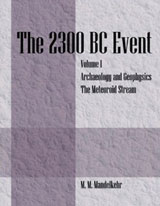
“The 2300 BC Event takes a new look at an old puzzle: what happened
at this date to cause the various advanced societies on the Earth to simultaneously collapse?
Civilizations in Anatolia and Greece, through Egypt and the Middle East, and eastward to India and Central Asia were at their height. The collapse of these civilizations due to earthquakes and climatic changes has been mirrored by similar interruptions on all continents, in the Arctic, and extending to the Pacific.
The discontinuities have long puzzled archaeologists and historians. New religions and accompanying mythologies appeared at this time in all cultural regions describing bombardment and flooding from the skies.
Strangely, the dominant aspect of the mythologies, however, is the observation and worship of a ring appearing to surround the Earth, oriented to the two Ursa (Bear) constellations.”
Get This Book From:
Amazon.com
Amazon.co.uk
“The 2300 BC Event Vol. 2:
Mythology
The Eyewitness Accounts”
by
M. M. Mandelkehr
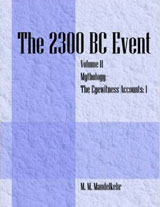
“Some time around 2300 BC the Eath encountered a dense clustering of space debris, the early Southern & Northern Taurid meteoroid stream. The result was an intense fall of meteoroids, some of them sufficiently large to cause surface destruction.
Simultaneous with the meteoroid fall was a huge downpouring of water which caused flash flooding. Extensive destruction and loss of life resulted. An astonishing aspect of the event was the formation of a ring surrounding the Earth, reflecting sunlight during the day, hiding some stars at night, and moving around the sky through a 24-hour period.
Following the ‘main event’, there were crustal movements which shifted the location of water sources, and caused earthquakes which destroyed settlements. Abrupt severe climate changes occurred.”
Get This Book From:
Amazon.com
Amazon.co.uk
“The 2300 BC Event Vol. 3:
Mythology
The Eyewitness Accounts 2″
by
M. M. Mandelkehr
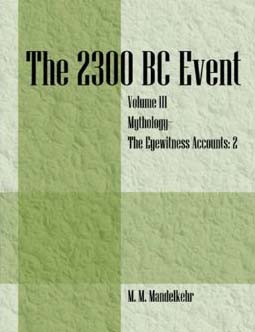
“The Northern/Southern Taurid meteoroid stream is identified as the specific meteoroid stream that the Earth encountered at 2300 BC.
The Earth’s encounter with a dense cluster of large objects would produce atmospheric phenomena very different from the pleasant and interesting night displays of meteor trails that are within our own experience.
The rain of objects would have generated extraordinary visual and auditory effects combined with ground vibrations; and under extreme conditions would bring about severe surface destruction and loss of life.
The overall event was associated by the people with powerful deities and formed the basis for major religions. The mythologies and traditions are, in large part, the residues of those religions.”
Get This Book From:
Amazon.com
Amazon.co.uk
“Natural Catastrophes During Bronze Age Civilisations”
(British Archaeological
Reports)
by
Benny J. Peiser
Trevor Palmer
Mark E. Bailey
(Editors)
Get This Book From:
Amazon.com
Amazon.co.uk
Research in the field of neo-catastrophism and impact cratering has quickened its pace since the early 1980s. Scholars such as Victor Clube, Bill Napier, Mark Bailey, Sir Fred Hoyle and Duncan Steel claim that a more ‘active’ sky might have caused major cultural changes of Bronze Age civilizations, belief systems and religious rituals.”
“Comets: A Chronological History of Observation, Science, Myth
and Folklore”
by
Donald K. Yeomans 

Get This Book From:
Amazon.com
Amazon.co.uk
Books from our
Astro-Archaeology
Bookshoppe
“A Little History of
Astro-Archaeology:
Stages in the Transformation
of a Heresy”
by
John Michell
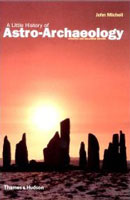
Get This Book From:
Amazon.com
Amazon.co.uk
“Stonehenge today is a battlefield, not only for police and festivalgoers at midsummer but also for rival camps of archaeologists, astronomers, and other researchers into the mysteries of prehistoric religion and science. Controversy flared up in 1963, when Gerald Hawkins made early use of the computer to identify Stonehenge as an observatory for the sun and moon and an instrument for predicting eclipses. Further studies of megalithic sites by Alexander Thom proved that many of them were also related to the seasonal positions of the heavenly bodies.
The study of astro-archaeology has now expanded worldwide, bringing new revelations about the mystical sciences of antiquity. This “little history” summarizes the issues involved in astro-archaeology, and illustrates its principal sites and personalities. Included are recent findings of British scientists, whose records of anomalous levels of natural energies at stone circles are in accordance with the magical reputations of such places in local folklore.”
“Avebury Cosmos:
The Neolithic World
of Avebury henge”
by
Nicholas R. Mann
“The ancient Britons were inspired by a profound knowledge of the heavens when they erected the monumental stones of Avebury.
Mann throws light on the motive behind the creation of its awe-inspiring mounds and megaliths by demonstrating that they were aligned to the cycles of the Sun, Moon and stars.
This book will help visitors and readers to see Avebury in a wholly new light – the light of the heavenly bodies that guided its Neolithic builders.”
Get This Book From:
Amazon.com
Amazon.co.uk
“Avebury:
Sun, Moon and Earth”
by
Maria Wheatley
&
Busty Taylor
Get This Book From:
Amazon.com
Amazon.co.uk
“Chaco Astronomy:
An Ancient American Cosmology”
by
Anna Sofaer
“After rumors surfaced about the sun bisecting a petroglyph at Chaco Canyon, people never looked at the site the same again.
The discovery proposed a cosmology at Chaco, and the book looks at the people who lived in the San Juan Basin from 850 AD to 1300, developing an elaborate culture around the cycles of the sun and moon.
Anna Sofaer’s pioneering work on Chaco Canyon, a World Heritage Site, should be required reading for anyone interested in how the prehistoric people of the American Southwest conceptualized their universe and placed themselves within that universe.”
Get This Book From:
Amazon.com
Amazon.co.uk
“A Guide to Prehistoric
Astronomy in the Southwest”
by
J. McKim Malville
“Dr. J. McKim Malville has outdone himself in this guide to prehistoric astronomy.
Even a reader with little or no background in archaeoastronomy will like this book.
One reason is the tons of good photos and diagrams that can help anyone better appreciate the miraculous order of our solar system and the stars.
It would make a great gift for children between 10 and 16, potentially stimulating them to enter the field of science.”
Get This Book From:
Amazon.com
Amazon.co.uk
“Patterns in the Sky:
An Introduction to Ethnoastronomy”
by
Stephen M. Fabian
“Since the beginning of humankind, people around the world have had a strong interest in the powers and beings perceived in the sky.
This compelling short work helps students fully understand and appreciate the ways in which non-Western indigenous and small-scale societies perceive, conceptualize, and make sure of what they astronomically observe.
With its concise explanations of prominent astronomical phenomena, discussions of relevant crosscultural examples, and instructive suggestions for active field research, Patterns in the Sky is a unique and practical guide for doing ethnoastronomy.
In addition, Fabian offers exercises in observational astronomy with the naked eye so that students can get in touch with the cosmos and natural world around them.”
Get This Book From:
Amazon.com
Amazon.co.uk
“Mysteries and Discoveries of Archaeoastronomy:
From Giza to Easter Island”
by
Giulio Magli
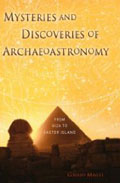
Get This Book From:
Amazon.com
Amazon.co.uk
“This complete, authoritative study of the growing discipline of Archaeoastronomy examines the role of astronomy in antiquity. Professor Giulio Magli provides a clear, up-to-date survey of current thinking on the motives of the ancients for building fabulous and mysterious monuments all over our planet. Was it an attempt to reproduce the sky on Earth, to bring down the power of the stars to where they could see it, worship it and use it?
The connecting thread is astronomy: Giulio Magli uses astronomy as a key to understanding our ancestors’ way of thinking. It is a challenge he likes to call ‘predicting the past’ – archaeology as a science is able to make predictions, like any other science, and to check them.
All of the astronomical achievements of the past are considered as a whole, in a comprehensive way that shows the depth and breadth of the thought behind them. In the past, the motives of the ancients – and particularly their scientific thought – have often been misconstrued, maligned or even dismissed.
In an ironic, provocative style, Professor Magli shows the limitations of orthodox archaeology in the face of astronomically-based artefacts and tries to understand what led the ancients to construct magnificent buildings such as the city of Teotihuacan in the Mexico Valley, the Ceremonial Centre of Chaco Canyon in the USA, the Avebury stone circle in Great Britain or the Great Pyramids in Egypt.
The book is divided into two parts. In the first, the reader is taken on an ideal ‘world tour’ of many wonderful and enigmatic places in almost every continent, in search of traces of astronomical knowledge and lore of the sky. In the second part, Giulio Magli uses the elements presented in the tour to show that the fundamental idea which led to the construction of the astronomically-related giant monuments was the foundation of power, a foundation which was exploited by ‘replicating’ the sky.
A possible interpretive model then emerges that is founded on the relationship the ancients had with “nature”, in the sense of everything that surrounded them, the cosmos. The numerous monumental astronomically aligned structures of the past then become interpretable as acts of will, expressions of power on the part of those who held it; the will to replicate the heavenly plane here on earth and to build sacred landscapes.”
“Canada’s Stonehenge: Astounding Archaeological Discoveries in Canada, England, and Wales”
by
Gordon Freeman
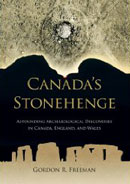
Get This Book From:
Amazon.com
Amazon.co.uk
“The discovery of a 5000-year-old Sun Temple and an ancient “time machine” – Stone Age calendar – in Canada led scientist Gordon Freeman to ground-breaking discoveries in Stonehenge. During fieldwork and research from 1986 to 2006, Freeman found striking similarities between the surface geometry of the two sites.
These similarities push back the boundaries of written history and have far-reaching implications for North American and European history.
Passion and science blend in this remarkable, readable book, as Freeman takes us along on his patient and exciting discovery of a 5000-year-old Temple in the plains of Alberta. What he finds at the Majorville Medicine Wheel in turn informs his convincing account of Stonehenge archaeoastronomy”
“Under Ancient Skies:
Ancient Astronomy and
Terrestrial Catastrophism”
by
Paul Dunbavin
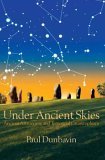
Get This Book From:
Amazon.com
Amazon.co.uk
“In all of the world’s myths and religions we find traditions of a Great Flood. There are stories too of a Golden Age: the antediluvian paradise that it destroyed. Might these be real memories of the ancient world? And how can we analyse the subject scientifically? The key to unlock these ancient myths lies in astronomy. “Under Ancient Skies” will examine the astronomical evidence for an ancient cataclysm and in the process will explore a number of related anomalies in prehistory, including: Was there a single great flood in human prehistory, or have there been many?
Could the workings of ancient calendars and the records of ancient eclipses give us clues about the Flood and the antediluvian world? Did the Celtic Druids use a calendar based on the orbit of Saturn; and is this the same antediluvian calendar as is described in Plato’s myth of Atlantis? Do Hindu, Chinese and Mayan cosmology myths recall the years after the Flood when our world wobbled on its axis?
Geologists have recently found the crater in Yucatan, where an asteroid impact destroyed the world of the dinosaurs. Scientists and astronomers have stopped dismissing the theory that a comet could have struck the Earth during prehistory – but any suggestion that a comet impact just a few thousand years ago might have caused the Biblical Flood, remains the last taboo. It is time for this barrier too to be washed away. If you read this book and you understand it then be warned – it may scare you!”
“Stonehenge: A New Interpretation of Prehistoric Man and the Cosmos”
by
John David North

Get This Book From:
Amazon.com
Amazon.co.uk
“Stonehenge has fascinated mankind for centuries, enveloping generation after generation in its haunting mystery. But while much has been learned about this ancient monument, the fundamental questions remain: Who built it? What was its purpose? How was it used?
Drawing on more than 15 years of research, John North has at last succeeded where others have failed. He comprehensively examines Stonehenge from all available angles — archeological, astronomical, and spiritual — and considers relevant research from other prehistoric remains in Britain and Northern Europe. He shows, for the first time, that the stones were not so much sighting devices as maps of the heavens and that the design of the monument evolved over thousands of years rather than conforming to a single original blueprint.
Such observations form the basis of deductions about prehistoric life and religion that will profoundly affect our understanding of who we are and where we came from.”
Amazon
Instant Video
Rent or Buy more than 50,000 top new movie releases
1000s of must-see TV shows
science documentaries
and all-time classics
(MANY IN HD)
All Available To
DOWNLOAD
or
STREAM
on the widest variety
of popular devices including
Kindle Fire HD
iPad, iPhone
Xbox One, Xbox 360
Wii & Wii U
PS4, PS3
“A Sumerian Observation of the Kofels’ Impact Event”
by
Mark Hempsell
&
Alan Bond
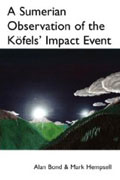
Get This Book From:
Amazon.com
Amazon.co.uk
Around 700 BC an Assyrian scribe in the Royal Place at Nineveh made a copy of one of the most important documents in the royal collection.
Two and a half thousand years later it was found by Henry Layard in the remains of the palace library.
It ended up in the British Museum’s cuneiform clay tablet collection as catalogue No. K8538 (also called “the Planisphere”), where it has puzzled scholars for over 150 years.
In this monograph Bond and Hempsell provide the first comprehensive translation of the tablet, showing it to be a contemporary Sumerian observation of an Aten asteroid over a kilometre in diameter that impacted Köfels in Austria in the early morning of 29th June 3123 BC.”
“Megaliths, Myths &
Men: An Introduction to
Astro- Archaology”
by
Peter Lancaster Brown

Get This Book From:
Amazon.com
Amazon.co.uk
“Noted British astronomer’s fascinating study of early astronomical knowledge through the interpretation of Stonehenge, Carnac, other megalithic sites. Stone Age sculpture, astronomical computations, radiocarbon dating, many other topics. Over 140 maps, photos, illustrations. “…essential summary of astronomy in the Stone Age”. Bibliography. Index”
“Ancient Astronomers:
Exploring the Ancient World”
by
Anthony F. Aveni,
Jeremy A. Sabloff
(Editor)
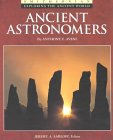
Get This Book From:
Amazon.com
Amazon.co.uk
“Anthony Aveni is well known in scholastic circles for his many excellent and ground-breaking publications in the field of archaeoastronomy. This particular volume is geared toward interested laymen and uninitiated scholars who are not yet well grounded in the history of astronomy or ideas of cosmology from an anthropological perspective. The book is graced with numerous and apt illustrations, while the text reads easily with Aveni’s smooth and informative style. Chapters were clearly organized thoughtfully, as information builds upon previous explanations and new concepts or ideas are charted out for the neophytes as needed.”
“Stairways to the Stars: Skywatching in Three Great Ancient Cultures”
by
Anthony Aveni

Get This Book From
Amazon.com
Amazon.co.uk
“What was the meaning of Stonehenge? What was the Mayan Code? Why was the elaborate Incan city of Cuzco built? Groundbreaking archaeoastronomer Anthony Aveni offers a host of startling new insights and conclusions in this acclaimed study of three of life’s most mesmerizing mysteries.”
“Secrets of the Stones:
New Revelations of
Astro-Archaeology and
the Mystical Sciences
of Antiquity”
by
John Michell
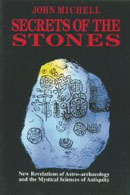
Get This Book From:
Amazon.com
Amazon.co.uk
“Natural Catastrophes During Bronze Age Civilisations”
(British Archaeological
Reports)
by
Benny J. Peiser
Trevor Palmer
Mark E. Bailey
(Editors)
Get This Book From:
Amazon.com
Amazon.co.uk
Research in the field of neo-catastrophism and impact cratering has quickened its pace since the early 1980s. Scholars such as Victor Clube, Bill Napier, Mark Bailey, Sir Fred Hoyle and Duncan Steel claim that a more ‘active’ sky might have caused major cultural changes of Bronze Age civilizations, belief systems and religious rituals.”
|